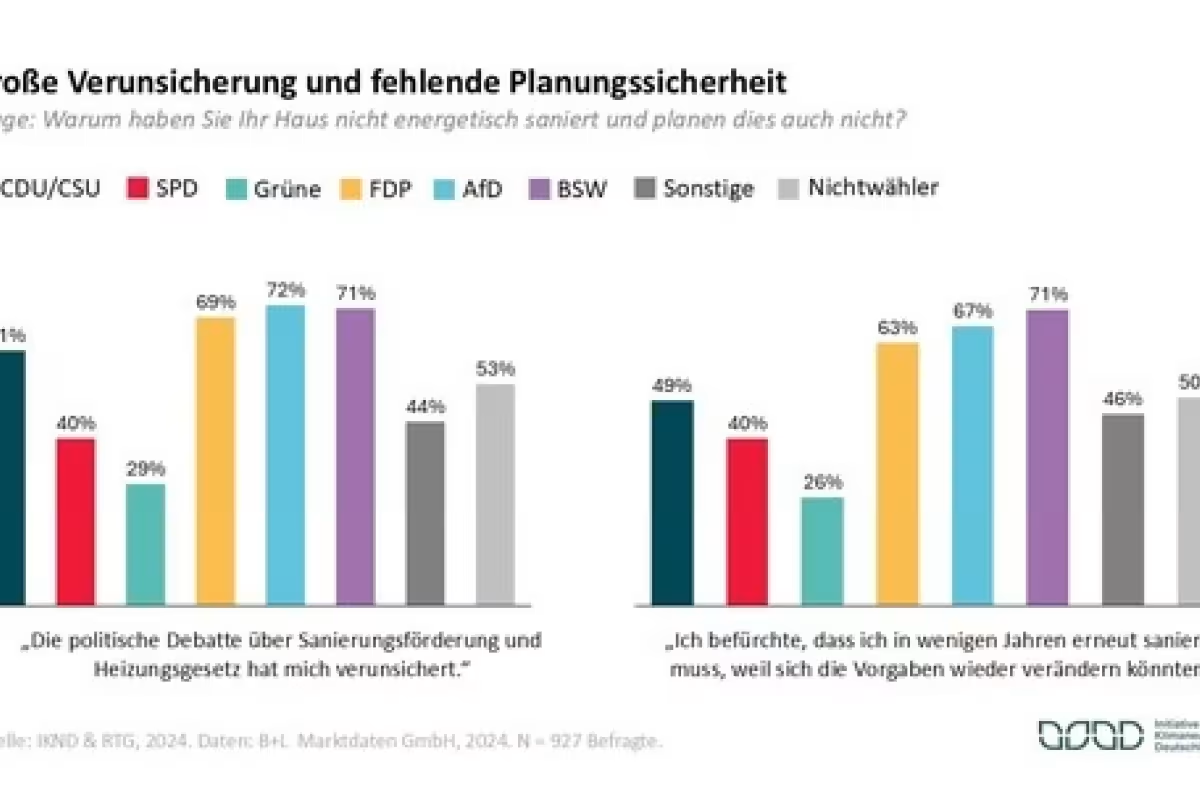
SHERIDAN, WYOMING – Feb. 1, 2025 – A growing sense of political instability surrounding Germany’s Building Energy Act has led homeowners to postpone critical energy-efficient renovations, jeopardizing both national climate targets and the long-term value of millions of homes. A new survey reveals widespread hesitation among property owners, highlighting the urgent need for stable policies to reignite progress in the building sector.
Political Chaos Stalls Energy Renovations
A representative survey of over 2,000 German homeowners, commissioned by the Initiative Klimaneutrales Deutschland (IKND) and the Repräsentanz Transparente Gebäudehülle (RTG), found that debates over revising the Building Energy Act—commonly referred to as the “Heizungsgesetz” (Heating Act)—have created significant uncertainty. More than 50% of respondents admitted delaying renovations due to fears of changing regulations, with hesitation highest among CDU/CSU (61%) and FDP (69%) voters.
Carolin Friedemann, founder and managing director of IKND, warns, “These are bad news. Germany’s housing stock is aging rapidly. To meet EU climate targets, at least 2% of homes need annual renovations, but we’re currently below 1%.” The stagnation threatens Germany’s ability to reduce carbon emissions and modernize its housing infrastructure.
Homeowners Demand Stability
An overwhelming 91.5% of homeowners across political affiliations expressed a desire for clearer, more reliable policies from the federal government. CDU/CSU supporters showed the strongest demand for stability (95%). Many respondents linked their hesitation to concerns that requirements for renovations—such as heating system upgrades, window replacements, or insulation improvements—could shift within years, rendering current investments obsolete.
“Reliability is the foundation of security in daily life and retirement planning,” Friedemann emphasizes. “The current government has squandered this trust with the Building Energy Act. The next administration must restore confidence to advance the energy transition.”
Impact on Climate Goals and Housing Security
For 60% of homeowners, their property represents more than an asset—it symbolizes “residential security.” Another 40% associate their homes with “comfort” or “retirement planning.” However, political unpredictability is eroding this sense of stability. Delays in renovations not only hinder climate progress but also risk lowering property values and living standards for millions.
The construction industry, once a pillar of Germany’s economy, is also feeling the strain. In 2023, over €420 billion flowed into building construction and modernization, but both sectors are now contracting. Thomas Drinkuth, representing RTG, stresses, “The construction industry urgently needs reliable funding programs and laws. High investments require trust, which is currently lacking.”
Industry Calls for Reliable Policies
Drinkuth adds, “The next federal government must create stable conditions to reverse this negative trend and revive the construction sector.” His sentiment is echoed by Dr. Sandra von Möller, board member of the consumer protection association Wohnen im Eigentum, who highlights challenges faced by housing communities: “Homeowner associations need years to plan renovations due to structural complexities. Unreliable policies could bring these projects to a standstill.”
Challenges for Housing Communities
Dr. von Möller explains, “Resolutions for renovations in housing communities often take multiple annual meetings to approve. Predictable policies and funding are essential—otherwise, energy upgrades may never start or stall entirely.”
About the Study
Conducted by B+L Marktdaten GmbH in August/September 2024, the survey polled 2,028 owner-occupiers of single- and two-family homes, representing Germany’s 16 million such properties. The full study, building on similar 2022 research by IKND, is available for download.
A Path Forward
As Germany approaches its next legislative period, stakeholders urge policymakers to prioritize clarity and continuity. Friedemann argues, “The Building Energy Act must evolve—not be rolled back—to align with EU standards. Populist debates only deepen uncertainty.”
With housing security, economic growth, and climate targets at stake, the call for political reliability has never been louder. Homeowners, industry leaders, and environmental advocates alike await decisive action to reignite Germany’s energy transition.